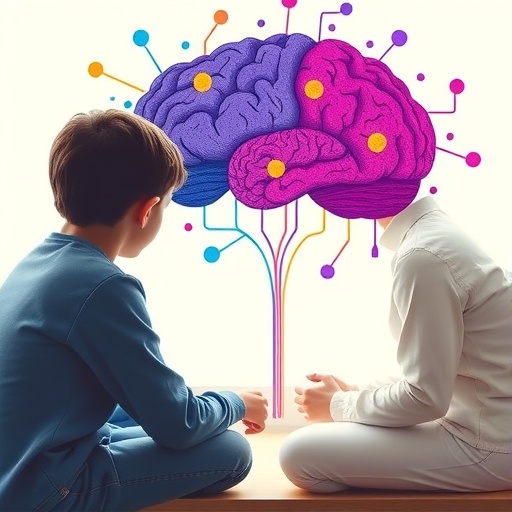In a groundbreaking advancement for mental health treatment, a recent study explores the transformative potential of internal cohesion psychotherapy in enhancing the psychological well-being of youth grappling with mood disorders. This pioneering research sheds new light on how an integrated therapeutic approach focusing on internal psychological unity can bolster self-esteem, improve self-regulation, and ignite motivation in young individuals confronting complex emotional challenges.
Mood disorders, including depression and bipolar disorder, are notoriously difficult to treat among adolescents and young adults due to their multifaceted nature and the turbulent developmental period involved. Traditional therapies often target isolated symptoms or surface-level manifestations of distress, but this novel intervention aims to delve deeper into the underlying psychic coherence that may either fragment or unify the individual’s emotional experience. Internal cohesion psychotherapy, as conceptualized by the researchers, seeks to harmonize disparate components of the self, thereby fostering a more robust and resilient sense of identity and emotional stability.
Central to this therapeutic approach is the concept of “internal cohesion,” defined as the integrative process by which individuals consolidate conflicting emotions, thoughts, and impulses into a coherent self-system. The study posits that enhancing this psychological integration can have cascading benefits on fundamental mental health parameters such as self-esteem, the subjective valuation of one’s worth, and self-regulation, which controls impulsivity and emotional reactivity. This triple-axis therapeutic target makes the approach unique, focusing simultaneously on the intrapersonal dynamics that dictate long-term emotional health trajectories.
Through a rigorous longitudinal framework, researchers tracked participants over several months, employing validated psychometric tools to quantify changes in self-esteem, self-regulation efficacy, and motivational states. The youth cohort exhibited significant improvement across all measured domains, with statistical analyses confirming that internal cohesion psychotherapy was a key driver behind these positive trends. Importantly, these outcomes were sustained, suggesting the intervention’s robustness and potential for long-term mental health stabilization in a population notoriously vulnerable to relapse.
One technical innovation within the study was the use of advanced neuropsychological assessments and psychophysiological monitoring to objectively measure changes in emotional regulation pathways. By integrating biometric data such as heart rate variability and cortical activity patterns with subjective self-report measures, the investigators delivered a comprehensive portrayal of how internal cohesion processes translate into tangible neurobiological adaptations. These findings resonate with emerging theories about the neuroplastic nature of psychotherapy and its capacity to rewire dysfunctional brain networks implicated in mood disorders.
Moreover, the therapy was delivered in structured sessions combining cognitive-behavioral strategies with psychoanalytic insight and mindfulness techniques. This synthesis allowed for a customized intervention tailored to the dynamic emotional landscapes seen in youth with mood disorders. Patients were guided not only to recognize fragmented parts of their identity but also to foster compassionate acceptance and purposeful alignment of internal experiences, thereby enhancing emotional congruence and psychological empowerment.
The study’s implications extend beyond immediate clinical outcomes to inform broader theoretical models of psychopathology. By validating the role of internal cohesion, it challenges reductionist models that silo symptoms and encourages a holistic view of mental health recovery as an emergent property of self-integration. This paradigm shift has practical ramifications for how clinicians conceptualize treatment goals and measure therapeutic success.
Furthermore, the enhanced motivation observed among participants supports an intriguing link between internal psychological harmony and goal-directed behavior. Motivation in mood disorders is a particularly elusive therapeutic target, often undermined by neurochemical imbalances and cognitive distortions. The finding that fostering internal cohesion can restore motivational drive opens new frontiers in improving patient engagement and adherence to treatment protocols.
Critically, the researchers underscore the potential for scalability and adaptation of internal cohesion psychotherapy across diverse cultural and clinical settings. Given the complexity of mood disorders and variability in treatment responses, adaptable frameworks that respect individual differences in psychological structure are imperative. This approach’s emphasis on self-system integration rather than symptomatic suppression aligns well with personalized medicine trends gaining momentum in mental health care.
The trial also highlighted the role of therapist skill and the therapeutic alliance in facilitating internal cohesion. While the method relies on structured techniques, its success largely depends on the clinician’s capacity for empathy, attunement, and flexibility. This underscores the importance of training programs and ongoing clinician supervision to maintain therapeutic fidelity and maximize patient outcomes.
Despite these promising results, the study acknowledges limitations, including the sample size and demographic concentration. Larger scale research with diverse populations will be essential to fully validate the efficacy and generalizability of internal cohesion psychotherapy. Additionally, integrating emerging technologies such as digital therapeutics and AI-guided interventions may enhance accessibility and precision of therapeutic delivery.
In conclusion, this cutting-edge study reveals that internal cohesion psychotherapy holds substantial promise as a multifaceted intervention to foster positive mental health outcomes among youth with mood disorders. By enhancing self-esteem, fortifying self-regulation, and reigniting motivation, it addresses core dimensions of psychological functioning that are often neglected in standard care. The convergence of psychological theory, neurobiological evidence, and clinical practice embodied in this research represents a bold step forward in mental health treatment paradigms.
As mental health crises continue to escalate globally, particularly among younger populations, development and dissemination of innovative therapies like internal cohesion psychotherapy will be imperative. Empowering youth not just to survive but to thrive psychologically heralds a new era of hope and healing, one built on the foundation of inner unity and holistic self-understanding. Future research and clinical efforts will determine how this emergent approach can be integrated into comprehensive mental health services to transform the lives of millions confronting mood disorders worldwide.
Subject of Research: The impact of internal cohesion psychotherapy on self-esteem, self-regulation, and motivation among youth with mood disorders.
Article Title: Fostering positive mental health outcomes: exploring the impact of internal cohesion psychotherapy on self-esteem, self-regulation, and motivation among youth with mood disorders.
Article References: Uka, F., Zharku, L., Maliqi, R. et al. Fostering positive mental health outcomes: exploring the impact of internal cohesion psychotherapy on self-esteem, self-regulation, and motivation among youth with mood disorders. BMC Psychol 13, 1255 (2025). https://doi.org/10.1186/s40359-025-03512-3
Image Credits: AI Generated




